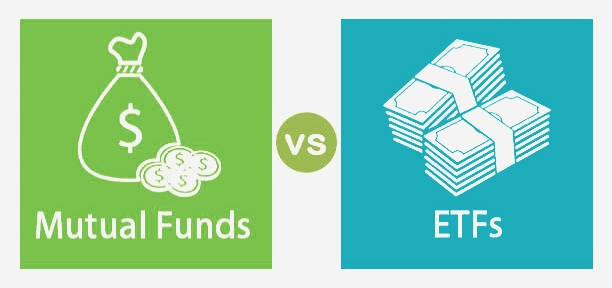ETFs vs mutual funds, an old debate. They both share several features. Because both types of funds are composed of a wide range of different assets, they are popular ways for investors to diversify.While there are many parallels between mutual funds and exchange-traded funds (ETFs), there are also some notable differences.Unlike stocks, which can be traded all day, mutual funds can only be purchased at the end of each trading day using a pricing calculation called the net asset value.One important difference between the etf vs mutual funds. So, in order to maximize the benefits, let’s learn more about these possibilities.
Etf vs mutual funds
Young people these days are more likely to invest their money in hopes of receiving fantastic returns quickly. In this regard, selecting between mutual funds and exchange-traded funds (ETFs) is the most challenging decision an investor must make.
These investment choices buy several individual stocks, bonds, and other assets by pooling the deposits of investors.Since ETFs are freely traded on the stock market, investors are free to purchase or sell shares as needed. The market price of these shares can be viewed in real-time, exactly like the price of ordinary shares. Regarding mutual funds, in order to purchase or sell mutual funds, you must make a request to the fund companies.
Moreover, there is no commission charged while buying or selling mutual funds. ETFs can be traded, but there is a cost associated with it.Conversely, an ETF does not have a minimum lock-in period, so you can exchange your shares at any time without incurring a cost.Furthermore, there are holding periods for mutual funds that range from 90 days to three years.If you buy or sell shares during this time, you will be subject to a steep penalty.
Etf vs mutual fund, which is better?
You are essentially investigating the question of whether active management can outperform indices over the long term when comparing mutual funds to exchange-traded funds (ETFs).
The efficient market hypothesis states that exchange-traded funds or index investing will always yield higher returns than actively managed funds.In affluent nations, exchange-traded funds (ETFs) have regularly beaten mutual funds, leading to their exceptional popularity.However, mutual funds have outperformed exchange-traded funds (ETFs) in emerging market countries because of their strong growth potential.The largest drawback of ETFs in emerging nations is the exclusion of strong small- and mid-cap companies with strong growth prospects.
ETFs, on the other hand, may be a better choice in terms of risk because they invest in the finest companies of their business. However, mutual funds can be an excellent option for you if you have a lengthy investing horizon and are prepared to accept a reasonable amount of risk in exchange for higher returns.In addition to this theoretical stance, take note of one practical consideration. To invest in ETFs in India, you require a trading account and a demat account.ETFs might not be right for you if opening and keeping these accounts makes you uncomfortable. If you do not want to open demat and trading accounts, you can alternatively invest in passive indices through index funds instead of ETFs.
FAQs
etf vs mutual fund returns?
Ans. Returnwise for long of short term investment, mutual funds win this race.
etf vs mutual fund which is
better?
Ans. Both are great investment strategies, you have to analyze your risk appetite and budget before choosing any of these.



